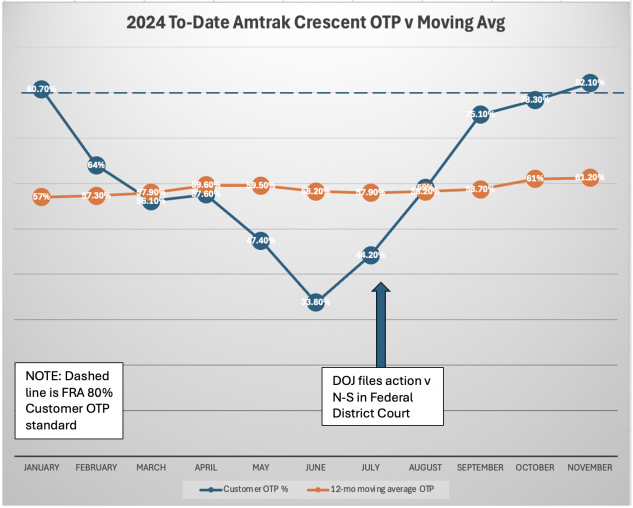Happening Now
N-S Gets More Time To Answer Justice Dept.
December 20, 2024
By Jim Mathews / President & CEO
Norfolk Southern now has until a week after the Inauguration to answer a Justice Dept. complaint filed this summer accusing the railroad of violating Amtrak’s legal right to preferential dispatching.
Just before the Thanksgiving break, a Federal judge granted Norfolk Southern’s motion asking for more time to respond to the Justice Dept.’s July 30 civil complaint, which alleged that poor on-time performance for Amtrak’s Crescent route between New York and New Orleans can be traced back to violations of the requirement in 49 U.S.C. § 24308(c).
Your Association was very pleased when Justice filed that action this summer. In our view, it’s long overdue. Dispatching Amtrak trains so that they are late more than 80 percent of the time—month after month, year after year—cannot be explained by bad weather, or supply chain disruptions, or any other operational vagaries. These trains didn’t have to be as late as they are, as routinely as they are. This is especially true now that the trains’ schedules have been certified by both the host railroad and by Amtrak.
And here’s something else to suggest that the Crescent’s delays on Norfolk Southern territory were largely avoidable: in the five months since the Justice Dept. filed its action, Customer on-time performance for the Crescent rebounded from a low of 33 percent to 82 percent in November. That’s good enough to meet the 80 percent standard set out in regulations during the last month of the first Trump Administration in 2020. Funny how getting hauled into court can concentrate your mind.

If long-distance trains are late often and everywhere, why the Crescent and why this case? The simple answer: even among the many Class I railroads to choose from, Norfolk Southern stuck out far enough to attract attention. In the second quarter of Fiscal 2024, Union Pacific and Norfolk Southern notched the highest number of host-responsible delay minutes per 10,000 train miles among the Class I railroads. UP and N-S were both well over 1,100 delay minutes per 10,000 train miles during the most recently reported fiscal quarter; compare that with the best-performing host railroad, CPKC, at just a shade over 500 total host-responsible delay minutes.
During that same quarter, Norfolk Southern’s rate of freight train interference delays was four and a half times larger than CPKC’s. At 486 minutes, N-S had more freight train interference minutes per 10,000 train miles in the second fiscal quarter than any other Class I carrier, and about 20 percent more than the railroad with the next-highest rate of freight train interference (BNSF).
I still hear from time to time from my friends at the host railroads that they fear that this Justice Dept. case, together with the action pending right now against Union Pacific at the Surface Transportation Board, means that every route will now be subject to litigation with the heft of Federal involvement.
And I continue to disagree: the fact that the Crescent and the Sunset both achieved record turnarounds in on-time performance within months of legal actions being opened shows that it’s not all about track geometry or Amtrak equipment failures or similar kinds of excuses. There are improvements available today, right now, as evidenced by these two trains’ recent OTP histories. And somehow CPKC manages to mostly get Amtrak trains out over the road on time, year in and year out. What seems to be missing is a willingness among the worst performers to negotiate in good faith with Amtrak on schedules and performance. It shouldn’t take a Federal court – or its equivalent, in the case of the Surface Transportation Board – to compel both sides to sit in a room and work it out.
The motion that Judge Amy Berman Jackson granted on November 21 in a D.C. District Court was a “consent motion.” That means Norfolk Southern and the Justice Dept. agreed to the delay and it wasn’t contested. It’s the second time both sides have agreed to a delay, and coupled to the reality of improved performance it may well be that Norfolk Southern – staring down the business end of a Federal lawsuit while it’s still licking its wounds from a bruising proxy battle for control of its Board – has decided to just work out how to do the right thing and run the trains better.
Replies are due January 27th, so maybe we’ll know for sure by then.
"Saving the Pennsylvanian (New York-Pittsburgh train) was a local effort but it was tremendously useful to have a national organization [NARP] to call upon for information and support. It was the combination of the local and national groups that made this happen."
Michael Alexander, NARP Council Member
April 6, 2013, at the Harrisburg PA membership meeting of NARP
Comments